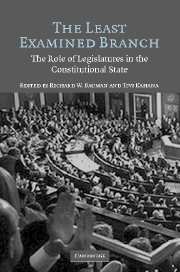Book contents
- Frontmatter
- Contents
- Foreword: Legislatures in the Constitutional State by Amy Gutmann
- Contributors
- New Ways of Looking at Old Institutions
- PART ONE LEGISLATURES AND DEMOCRATIC THEORY
- PART TWO LEGISLATING AND DELIBERATING IN THE DEMOCRATIC LEGISLATURE
- PART THREE CONSTITUTION MAKING BY LEGISLATURES: THE EXPLICIT VERSION
- PART FOUR CONSTITUTION MAKING BY LEGISLATURES: THE IMPLICIT VERSION
- PART FIVE CONSTITUTIONAL INTERPRETATION AND APPLICATION BY THE LEGISLATURE
- PART SIX IS LEGISLATIVE CONSTITUTIONALISM POSSIBLE?
- PART SEVEN THE LEGISLATURE IN DIALOGUE: DOMESTIC AND INTERNATIONAL CONTEXTS
- 25 Disobeying Parliament? Privative Clauses and the Rule of Law
- 26 Look Who's Talking Now: Dialogue Theory and the Return to Democracy
- 27 An International Community of Legislatures?
- 28 Legislatures in Dialogue with One Another: Dissent, Decisions, and the Global Polity
- Index
25 - Disobeying Parliament? Privative Clauses and the Rule of Law
Published online by Cambridge University Press: 06 August 2009
- Frontmatter
- Contents
- Foreword: Legislatures in the Constitutional State by Amy Gutmann
- Contributors
- New Ways of Looking at Old Institutions
- PART ONE LEGISLATURES AND DEMOCRATIC THEORY
- PART TWO LEGISLATING AND DELIBERATING IN THE DEMOCRATIC LEGISLATURE
- PART THREE CONSTITUTION MAKING BY LEGISLATURES: THE EXPLICIT VERSION
- PART FOUR CONSTITUTION MAKING BY LEGISLATURES: THE IMPLICIT VERSION
- PART FIVE CONSTITUTIONAL INTERPRETATION AND APPLICATION BY THE LEGISLATURE
- PART SIX IS LEGISLATIVE CONSTITUTIONALISM POSSIBLE?
- PART SEVEN THE LEGISLATURE IN DIALOGUE: DOMESTIC AND INTERNATIONAL CONTEXTS
- 25 Disobeying Parliament? Privative Clauses and the Rule of Law
- 26 Look Who's Talking Now: Dialogue Theory and the Return to Democracy
- 27 An International Community of Legislatures?
- 28 Legislatures in Dialogue with One Another: Dissent, Decisions, and the Global Polity
- Index
Summary
Although in theory perhaps, it may be possible for Parliament to set up a tribunal which has full autonomous powers to fix its own area of operation, that, so far, has not been done in this country. The question, what is the tribunal's proper area, is one which it has always been permitted to ask and to answer, and it must follow that examination of its extent is not precluded by a clause conferring conclusiveness, finality, or unquestionability upon its decisions…. In each task [the courts] are carrying out the intention of the legislature, and it would be misdescription to state it in terms of a struggle between the courts and the executive. What would be the purpose of defining by statute the limit of the tribunal's powers, if, by means of a clause inserted in the instrument of definition, those limits could be safely passed?
The judges appreciate, much more than does Parliament, that to exempt any public authority from judicial control is to give it dictatorial power, and this is so fundamentally objectionable that Parliament cannot really intend it… . [C]lauses excluding the courts [are] left with no meaning at all and … judges will be unable to deny that they are flatly disobeying Parliament…. All law students are taught that Parliamentary sovereignty is absolute. But it is judges who have the last word. If they interpret an Act to mean the opposite of what it says, it is their view which represents the law. Parliament may of course retaliate.
- Type
- Chapter
- Information
- The Least Examined BranchThe Role of Legislatures in the Constitutional State, pp. 499 - 518Publisher: Cambridge University PressPrint publication year: 2006
- 1
- Cited by



